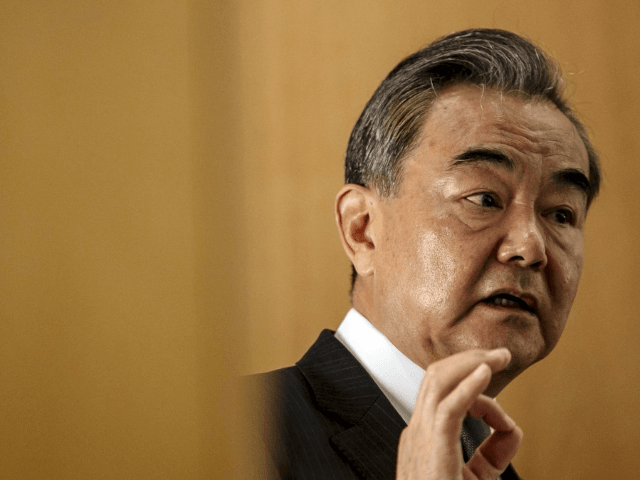Chinese Foreign Minister Wang Yi announced the launch of a “global data security initiative” on Tuesday. The plan mimics the U.S. “Clean Network” initiative in theory, but in practice is meant to intimidate other countries out of following America’s advice to blacklist Chinese companies from participating in their 5G wireless networks and other electronic infrastructure.
Voice of America News (VOA) noticed how Wang’s plan mirrored the Clean Network initiative put forward by U.S. Secretary of State Mike Pompeo last month – except, of course, without Pompeo’s warning that the Chinese Communist Party is one of the worst “malign actors” threatening privacy and information security around the world:
China’s initiative has eight key points including not using technology to impair other countries’ critical infrastructure or steal data and making sure service providers don’t install backdoors in their products and illegally obtain user data.
Wang, speaking in Beijing, also said the initiative seeks an end to activities that “infringe upon personal information” and opposes using technology to conduct mass surveillance against other states.
The initiative says companies should also respect the laws of host countries and stop coercing domestic firms to store data generated overseas in their own territory.
“China has always been broad and level, open and cooperative. If all countries, especially those intentionally smearing and slandering China with wild allegations, could make such a promise like China, it will be beneficial to the mutual trust and cooperation on digital security issues among all countries,” the Chinese Foreign Ministry said, making a thinly-veiled reference to Pompeo’s warning about China.
Chinese state media generally pretended the earlier U.S. Clean Network program did not exist, or was simply a wanton political smear against the noble Chinese Communist Party (CCP).
“The initiative comes against the backdrop of Trump administration cooking the so-called data threat from China’s high-tech companies in recent months,” China’s Global Times sneered on Tuesday.
“The move could be seen as a Chinese response to counter Washington’s ‘Clean Network’ program that clearly aims to smear and exclude Chinese technology firms, apps and services providers from some US allies,” the Global Times added, without mentioning anyone outside of Beijing who sees it that way.
An even more grandiose op-ed from the Global Times on Wednesday hailed China’s hastily cobbled-together response to the Clean Network initiative as a wondrous boon to all of humanity, while chafing at critics such as “anti-China U.S. Senator Rick Scott” (R-FL) for warning that “allowing China to set the global data security rules is like letting the fox guard the hen house.”
As with almost all current Chinese writing on trade and information security issues, the Global Times accused the U.S. of bringing a “Cold War mindset” into the digital sphere and harped on the 2013 leaks from U.S. national security contractor Edward Snowden, which the Chinese constantly present as definitive evidence the United States is the real menace in cyberspace.
“China, as a responsible major power, has a broader mind about this issue. It raises the proposal of building a global data security framework, and has realized that the issue has become a major concern for global digital governance. Cybersecurity is becoming increasingly important to national security. But the US only sees this area as place where it can claim total supremacy,” the CCP newspaper sniffed.
A Global Times breakdown of Foreign Minister Wang Yi’s announcement on Wednesday got down to brass tacks: China’s funhouse-mirror version of the Clean Network program is intended to prevent other countries from locking CCP-controlled companies out of its electronic infrastructure.
China’s eight-point plan is vague about everything except the importance of not blacklisting Chinese corporations:
For example, the fourth point stipulates that companies should be encouraged to abide by laws and regulations of the state where they operate, while states should not request domestic companies to store data generated and obtained overseas in their own territory. The fifth point says that states shall not obtain data located in other states through companies or individuals without other states’ permission. The seventh point requires providers of ICT products and services should not install backdoors in their products and services to illegally obtain users’ data. These are indeed vital to the security of all countries in the information age.
As we all know, the internet and digital economy have been developing rapidly, but the establishment of rules has not been able to follow in time. What is data security is an open concept that can be defined in many ways. Given how permeable the digital economy is to human economic activity, this issue is both very important and prone to misunderstandings, causing suspicion between countries.
“Global data security is the only way for humanity to advance deeply into the digital world. Please don’t look at it through a geopolitical lens. There is less geopolitics in the digital world, and there are real problems and collaborative, reciprocal solutions that need to be carefully worked out,” the Global Times concluded, writing less than a week after the exposure of the latest massive cyber-espionage campaign perpetrated by hackers linked to the Chinese government.

COMMENTS
Please let us know if you're having issues with commenting.